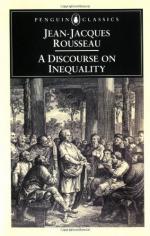
|
| Name: _________________________ | Period: ___________________ |
This quiz consists of 5 multiple choice and 5 short answer questions through Chapter 2, A Discourse on the Moral Effects of the Arts and Sciences, Part II.
Multiple Choice Questions
1. What does Rousseau consider to see if the contradiction he found was true?
(a) The arts and sciences.
(b) The government.
(c) The church.
(d) The wealth of the state.
2. What does Rousseau argue at the beginning of "Chapter 2, A Discourse on the Moral Effects of the Arts and Sciences, Part II"?
(a) That the arts are corrupt.
(b) Many civilizations believe that science arose from an enemy of humanity.
(c) That the government is corrupt.
(d) Many civilizations believe that art arose from an enemy of humanity.
3. Who spread knowledge to the masses, according to Rousseau?
(a) Priests.
(b) Kings.
(c) Historians.
(d) Textbook writers.
4. What was the state of France, according to Rousseau, as a result of the introduction of the arts and sciences?
(a) They discovered that they were better off in their ignorance.
(b) The needed the arts and sciences.
(c) The arts and sciences were only a luxury.
(d) The arts and sciences were a detrimental luxury.
5. How does Rousseau believe men should feel at the state of leaving ignorance?
(a) Ambivalent.
(b) Discerned.
(c) Proud.
(d) Humiliated.
Short Answer Questions
1. According to Rousseau, in the revival, the arts and sciences existed under what entities?
2. What should society teach men to do instead of pursuing virtue, according to Rousseau?
3. What civilizations does Rousseau follow to track the decline of morality?
4. Who does Rousseau think promulgates wicked doctrines?
5. What does Rousseau believe is the reason men now live apart?
|
This section contains 276 words (approx. 1 page at 300 words per page) |

|




